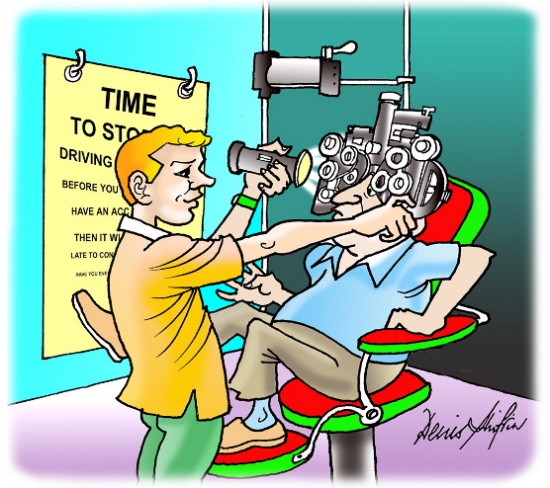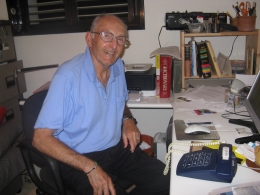
Illustration by Denis Shifrin
Sam Midman who lives in Raanana, is a 79 year old retired high school art teacher in relatively good health except for mildly high blood pressure that his doctor tells him is well under control with a pill he takes every day. The only health problem that bothers him is his vision, but it does not put a damper on his busy driving activities.
Sometimes he uses a magnifier to read small print, and a stronger light helps. He prefers not to drive at night, and prides himself on being an excellent driver, never had an accident and keeps his nine year old Subaru in excellent shape. His children have been encouraging him to get a new car, but no, he likes what he's got.
The fancy dashboards on those new cars make him feel like he's flying an airplane.
Twice a week he drives to pick up his grandchildren from school—a twenty minute ride each way, depending on traffic. Two mornings a week he drives to the Rehab Hospital — that's a longer ride — as a volunteer to give art lessons to the patients.
His wife, Dora, has not been well lately and he has to drive her to Kupat Cholim and then to the drug store to pick up medications. And of course there are frequent drives to the supermarket. Sam, as you can see, is a pretty busy man.
On a morning two weeks before his 80th birthday he picked up the usual packet of mail. Tucked in between the bills, adverts and an art magazine was an official looking envelope from the Licencing Authority of Motor Vehicles. What,
Sam wondered, did they want from him. His car had recently passed inspection — no problems there. There were no outstanding violations that he knew of. Opening the envelope was complicated - fold here, tear there. Sometimes his arthritis made his fingers stiff and caused a crick in his neck. Inside was a form for his license renewal. He needed a medical exam and an eye test.
No problem, he thought. His family doctor has known him for years and knows how healthy he is. The idea of an eye test bothered him. He's been wearing glasses for more than forty years, and he's had this latest pair for at least two or three years. Well, yes, he thought it was time to get to see that young optometrist. He was not too happy with that man—he had asked too many questions about his general health and medications. All he wanted was a new pair of glasses.
Three days later Sam went to see the eye doctor, bringing the motor vehicle registry
form.
"Hey doc" Sam began, "I got this thing in the mail and I need you to fill it out. If I need new glasses, that is OK with me, I'll get a new pair, but they had better not be too expensive. My wife and I are living on a tight budget of National Insurance and my teachers' pension.”
The doctor took the form, put it aside and had Sam sit in his chair. Sam was going to say something cute about it looking like a barber chair but thought better of it.
The doctor asked the usual questions about his health, his blood pressure, and then asked if he'd been having any problems with his eyes.
Hell no! Sam blurted. My eyes are fine. I see great, but if truth be told, I dont like driving at night and bright sunlight bothers me. I have a pair of sunglasses, but sometimes I forget to wear them.
The doctor proceeded with his testing and put what looked like a huge pair of glasses in front of Sam's face. "This large gadget is called a phoroptor" the doctor explained.
After all the testing, asking which lens was better - this or that, and shining lights in his eyes, the doctor told him he didn't need new glasses but should expect some changes in his "visual status" in the near future. What kind of "changes" was that man talking about, Sam wondered.
The doctor pulled the phoroptor away from Sam's eyes.
Sam he said,"I can't sign this form. Your eyesight is below Israeli standards for driving. Sam looked at the young man and hardly knew what to say.
Look he said, I'll buy a new pair of glasses — whatever you say. Whatever the cost. If I need them, I need them. I'd like to use my old frame if I can. Now just sign the form, give me your bill and I'll be on my way. I'm in a bit of a hurry,Sam continued, Today's my day for picking up the grandchildren.
Sam, the doctor continued, I guess I didn't make myself clear. I can't sign the form. Your eyesight is less than what's required. The doctor continued, I'm going to refer you to a professor in the eye clinic at the local hospital. Maybe he'll have some better news for you. And about new glasses, you can still use the ones you've got. A new lens prescription will not make a great deal of difference in the way you see.
Hey Doc, Sam asked Do I need an operation on my eyes? Some of my friends were told they have cataracts and had to be operated on. Do I have one of those? When? How soon? How about some eye drops?
The doctor continued, No Sam, you don't need any eye drops and you do not have a cataract. I wish you did.
Sam looked shocked. You wish I did? he asked incredulously.
Yes, Sam. You see, a cataract can be operated on with generally good results.
The doctor continued, What you have, Sam, is called macular degeneration, related to your age. The area of central vision in your retina, the back of the eye, is not working the way it should. The images the retina receives are not clear, and an operation won't help.
The optometrist, now being more optimistic, explained, From my examination, it appears the condition should not get any worse, and there are new treatment options that may help stabilize the vision. That's why I'm referring you to a specialist to find out if any of these options are appropriate for you. Sam, have you any questions?
I'll try to answer anything you're not sure of. Well" Sam said. I'm a bit confused by what you've told me, but I'll try to make the best of it.
So here we have an unhappily familiar scenario.
When and how do we know when it's time to turn in the keys to the family car?
We have two choices: 1) we decide that we can no longer safely handle a car or 2) the Licensing Authority of Motor Vehicles decides and your license renewal application is rejected.
The major cause of renewal rejection is vision, and in many cases that can be rectified by new glasses or surgical removal of the natural lens inside the eye that has become cloudy. That dirty lens cannot be cleaned It can only be replaced. That's what a cataract is all about.
When the doctor told Sam that there was a change in his visual status, it meant that Sam's vision could not be improved with a change of glasses, an eye operation or with medication.
Researchers have pointed out that nearly 25% of those patients about to undergo cataract surgery had been driving illegally due to poor vision. Once the lens was surgically removed and a new lens put in its place, relatively good vision was restored.
Driving, as we all know, requires more than just good visual acuity. When we read a book or watch TV, our visual attention is directed to a specific point in space—the TV screen or the book, and we tend to block out or pay little attention to what's happening elsewhere in our visual field.
When we drive, we must not only see but "interpret" and react to rapidly changing scenes in our visual field. Vision is only one of the factors, albeit an essential one, that influence how well and how quickly we react to potential hazards that may suddenly pop up in front of or around us while driving.
There is a five-step visual/motor sequential process that automatically takes place as we drive. We must……….
- see the object
- interpret what it is
- choose what to do: stop or go; ignore or avoid
- decide HOW to react
- REACT
All this takes time — fractions of a second — but when we're driving, time is of the essence.
As we grow older, because our reaction time slows down, we should drive more defensively and more slowly.
While driving our eyes perform a number of separate interrelated tasks such as seeing straight ahead through the windshield, looking at the dashboard (more complicated today with newer model cars) looking at front and side mirrors to locate and judge the speed of other cars, as well as noting stationary objects such as parked cars or pedestrians at the side of the road. The more skillful you are at these visual tasks, the more time you will have to make appropriate driving decisions, and you will be a better and safer driver.
Driving at night can be a particularly onerous task for the elderly driver requiring rapid light/dark/light adaptation with headlights coming straight on. This can create greater difficulties in judging the speed and location of other cars.
Once into our sixth or seventh decade of life, general health factors play a role in how well we drive. Here are only two examples:
- some medications we take may cause fatigue and drowsiness
- arthritis—can you answer YES to the following questions?
- can you easily turn your face in opposing directions?
- are you able to hold the steering wheel without feeling stiffness in your hands and arms ?
- are you able to maintain control of your feet and legs on the gas and brake pedals ?
As mature adults we should know when it's appropriate to stop driving before a serious accident forces us to. No one can know when that will be.
Only YOU, the driver, can know when your driving is no longer safe and poses a threat to you, your passengers who may include your grandchildren, and others on the road.
Sam's macular degeneration was in its early stages. His vision remained stable and there was little further deterioration. But Sam's days behind the wheel were numbered.
So, no matter how busy a driver you may be
STOP DRIVING BEFORE IT'S TOO LATE!
Byline: Gene Stollman is a semi-retired optometrist, having lived in Jerusalem since he came to Israel in 1969. At the beginning of 2010 the Stollmans moved to Ramat Gan.
 Gene Stollman
Gene Stollman
Related Articles